
Canada unveils new COVID-19 modelling data and it shows spread of virus is slowing
New COVID-19 modelling data from the Public Health Agency of Canada was just released on Thursday, and the numbers show that the country seems to be past the peak of the pandemic.
The update breaks down some key case demographics, shows how seriously different areas of the country have been impacted, and provides some future predictions.
It also shows how much the spread of the virus has thankfully slowed in recent weeks, reaching an R-naught value — which indicates how many new cases come from each existing case — of close to one.

Chart courtesy of the Public Health Agency of Canada
Of the 93,441 cases seen across the country so far, older Canadians have been shown to be at greater risk of what the agency calls "severe outcomes" — that is, hospitalization, admittance to an intensive care unit or death.
A staggering 94 per cent of Canada's 7,495 COVID-19-related deaths have been residents 60 or older. The age group also represents 71 per cent of our 8,742 hospitalized cases, 61 per cent of the 1,721 who were sick enough to be admitted to the ICU, and 37 per cent of all confirmed cases.
The outbreaks in long-term care homes account for 82 per cent of total fatalities from the infectious disease nationwide, as well as 18 per cent of total cases.

Chart courtesy of the Public Health Agency of Canada
Such congregate settings have been deemed vulnerable to COVID-19 outbreaks and spread, with hospitals, meat and poultry plants, correctional facilities, shelters and other similar facilities serving as the grounds for clusters of hundreds of linked cases.
"Movement of workers, whether between workplaces or across jurisdictions, has initiated new chains of transmission," the update reads, adding that outbreaks in close-quarter living and work situations have been driving up case counts in the country.
Despite these vulnerable settings, epidemic growth has shown to slow across all demographics since mid-to-late April, when numbers were at their peak. The median age of all patients has been around 51, with a split of 57 per cent female to 43 per cent male. The age breakdown of known cases is 31 per cent 40-59, 26 per cent 20-39, 19 per cent 80-plus, 18 per cent 60-79, and only 7 per cent 19 and under.
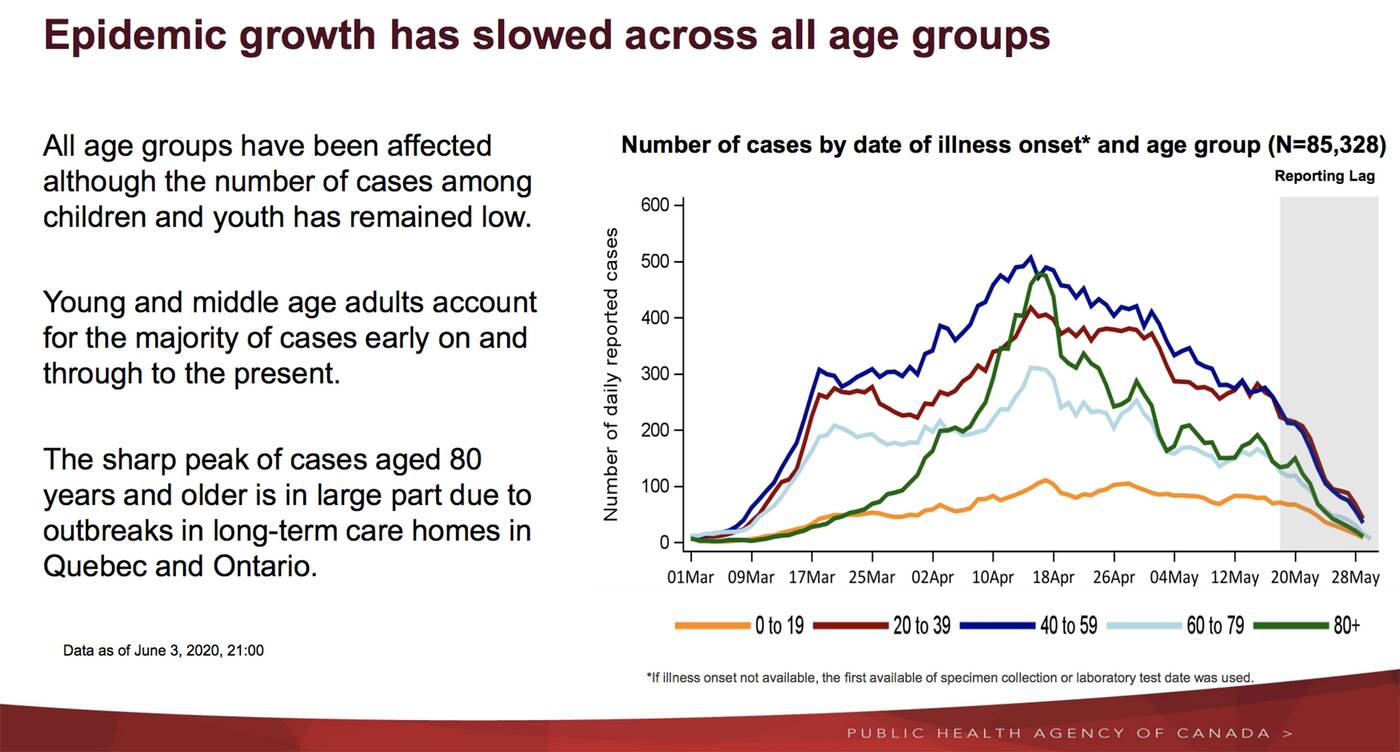
Chart courtesy of the Public Health Agency of Canada
There have also been a serious of "regional epidemics," with Ontario and Quebec hit the hardest overall and accounting for more than 90 per cent of cases diagnosed in the last two weeks.
P.E.I., the Northwest Territories and the Yukon have not seen any community transmission whatsoever, while there Nunavut has yet to have a single confirmed case.
Internationally, Canada has fared better than countries like the U.S., the U.K., and Italy, flattening the curve fairly early. Countries like Japan and South Korea have had significantly better control of the situation than us and others, and have kept their case numbers (in proportion to their respective populations) lower than most.
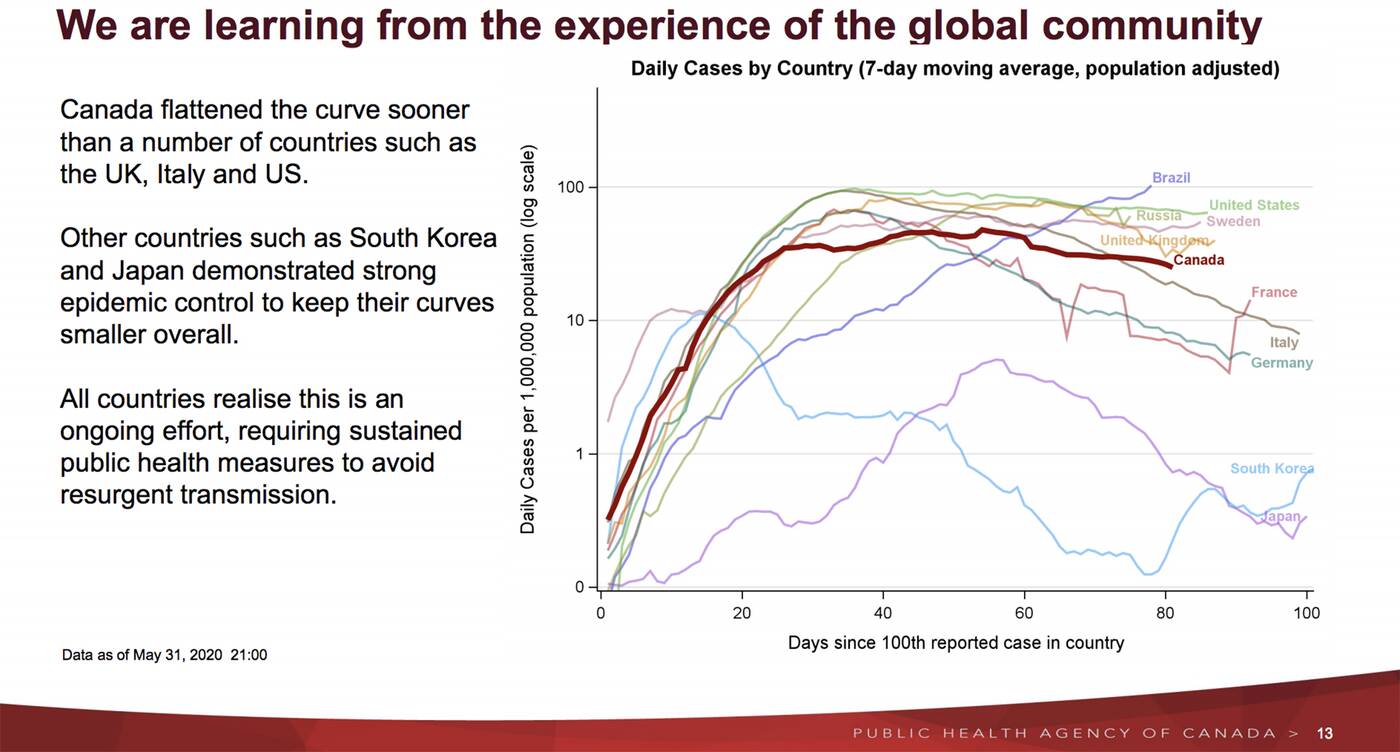
Chart courtesy of the Public Health Agency of Canada
Looking ahead, experts project that we will reach anywhere from 97,990 to 107,454 cases nationally in the next 11 days (up from the 93,441 known as of June 4), and jump to between 7,700 and 9,400 deaths (from the 7,495 known at the time of the report).
Where the country ends up within these ranges depends on how well measures like physical distancing are heeded, and how many cases and their potential contacts are properly identified and quarantined.
"As we re-open Canadian society, data and modelling indicate that core public health measures remain essential to control the epidemic in Canada," the update reads.
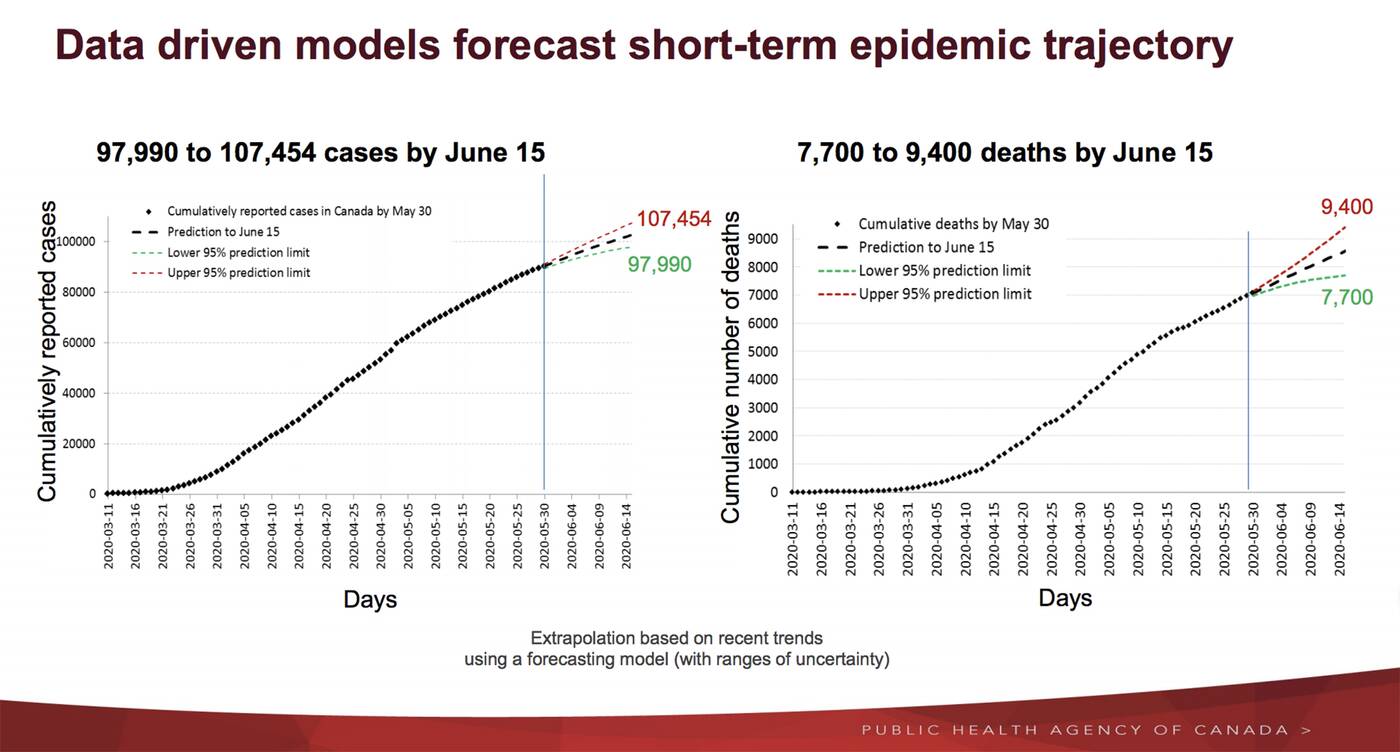
Chart courtesy of the Public Health Agency of Canada
With absolutely no such control efforts, the forecasts indicate that up to 70-80 per cent of people could become infected over the summer. With some weak controls and rule abiding, 25 to 50 per cent could become infected over summer and fall 2020, with the curve continuing into winter 2021. And with strong controls, the numbers are one to 10 per cent, flattening out sooner than the other two models.
"Lifting population-based measures without strengthening other public health measures will likely cause the epidemic to rebound," the report reads along side two very different charts that show a potential dramatic uptick in cases in the fall if we don't strengthen measures like physical distancing and contact tracing while we lift lockdown restrictions.
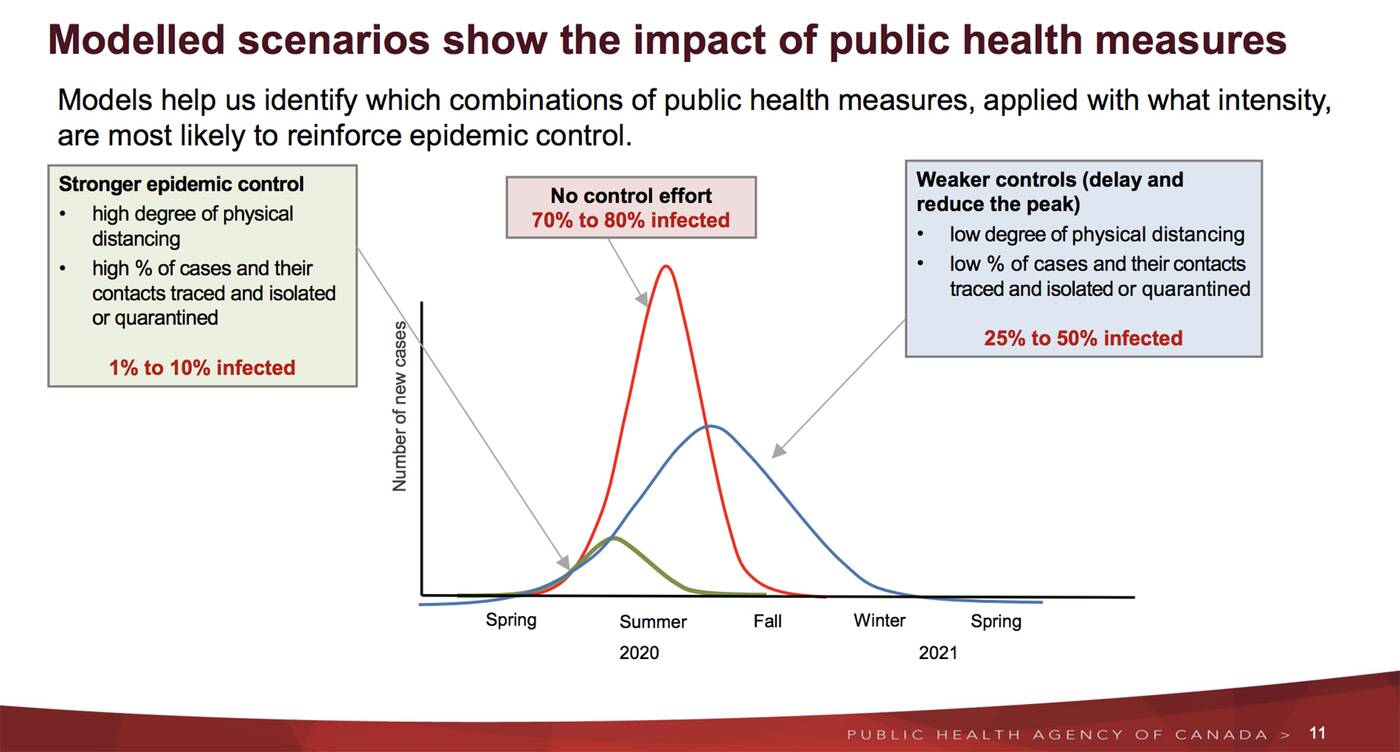
Chart courtesy of the Public Health Agency of Canada
"Living with COVID-19 will require ongoing effort," it says, acknowledging that the disease is something we will have to live with for some time, much like any other strain of coronavirus.
"Until there is a vaccine or effective treatment, we must carefully balance the risks associated with spread of COVID-19 with the unintended social and health consequences of restrictive public health measures."
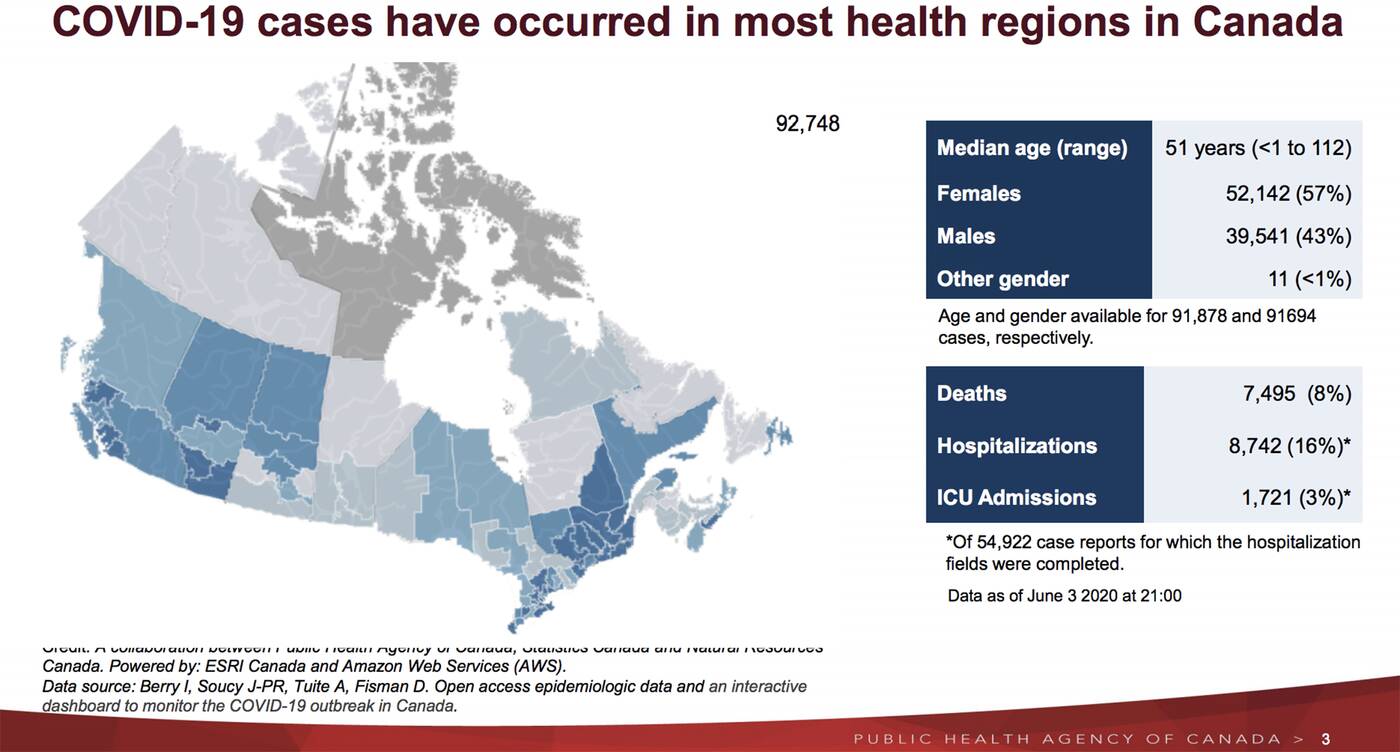
Chart courtesy of the Public Health Agency of Canada
Prime Minister Justin Trudeau talked about the modelling in his daily press briefing on June 4, likewise urging Canadians to continue to follow public health and safety orders to ensure case counts stay low.
Though he said that Canada is not yet out of the woods as far as the health crisis, he added that this new data shows that "we are continuing to make progress in the fight against this virus," and that "in many communities, the number of new cases is low, and we can trace where they came from. That's an encouraging sign that the virus is slowing and in some places, even stopping."
Latest Videos
Join the conversation Load comments







